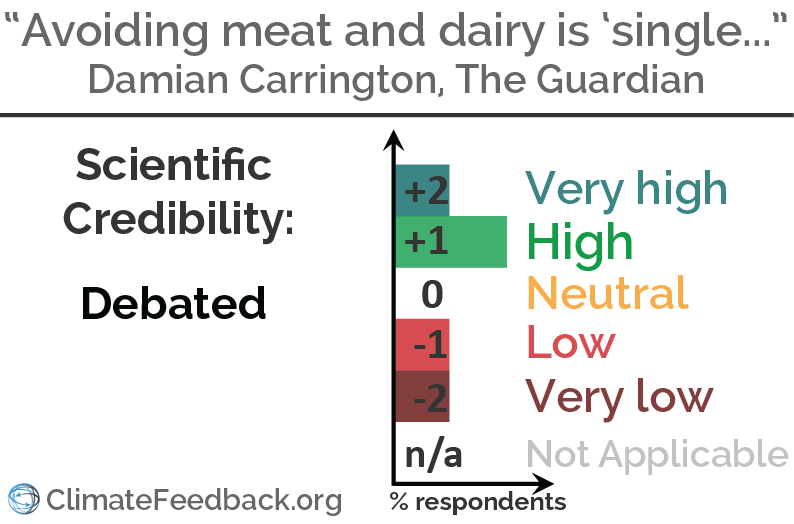- Climate
Guardian story on climate impacts of diet gets mixed reviews from scientists
Reviewed content

Headline: "Avoiding meat and dairy is ‘single biggest way’ to reduce your impact on Earth"
Published in The Guardian, by Damian Carrington, on 2018-05-31.

Scientists’ Feedback
SUMMARY
This article in The Guardian covers a study published in Science[1] that investigated environmental impacts related to the production of different types of foods in a number of regions around the world, finding that impacts could vary significantly from one place to another.
Scientists who reviewed the article gave it varied ratings while focusing on different aspects. Some noted that the headline, in particular, makes a more general claim—that “avoiding meat and dairy is ‘single biggest way’ to reduce your impact on Earth”—that isn’t directly supported by this particular study. These general statements relate to quotes from the researchers behind the study and are explained in less detail and with less context than the contents of the study itself, leaving them potentially misleading.
This is part of a series of reviews of 2018’s most popular climate stories on social media.
You can read the article here.
- [1] Poore and Nemecek (2018) Reducing food’s environmental impacts through producers and consumers, Science.
GUEST COMMENTS

Associate Professor, Chalmers University of Technology
The headline of the article is not a fair representation of the research paper, which mainly is about very comprehensive data analysis. But the quote of the lead author supports it. And the article overall gives a balanced and accurate description of the paper.

Professor, University of Aberdeen
The scientific publication referred to in the article was comparing the environmental impact of different foods. The article starts with the following “Avoiding meat and dairy products is the single biggest way to reduce your environmental impact on the planet…” This is wrong on two counts relative to the findings reported in the publication: 1) The publication only considered food—the journalist extrapolated to all human activities, and 2) The publication drew attention to heterogeneity both geographically and between different types of meat—the journalist did not make that distinction, again a gross extrapolation.

Research Specialist, University of Michigan
This article relies heavily on statements made by the authors of the covered journal article that are not necessarily supported in the journal article. The statement “avoiding meat and dairy is the single biggest way to reduce your environmental impact on the planet” is not quantified in the journal article, but appears to be an opinion of Joseph Poore.
More importantly, the main figure in this story is presented with the wrong units. The data on greenhouse gas emissions per unit of different food is reported in Poore and Nemeck as emissions per “100g of protein” from each food type, a critical distinction. It is also rather misleading (and confusing) to present the 90th percentile value as a datapoint and use that 90th percentile value as the reference (i.e., the comparison used in the figure title). Poore and Nemeck report means for all of these values: this would be a much more appropriate value to be reporting here.
The article provides a rigorous description of the Science article on the impact of different food products and the results of different changes in consumption patterns. The strong value added of the Science article is rather in the large dataset collected and the illustration of the heterogeneity in the level of impacts, as the average adverse impacts of food on the environment is documented elsewhere. As described by the article, this heterogeneity also means that becoming vegan is not the only option to have impact on the system. From this point of view, the title of the article is slightly misleading, as some big impacts could also be achieved by consuming products produced more efficiently. However, we illustrated with coauthors in another paper[1] that average EU diet impact on climate was equivalent to driving 6,000 km in a single passenger car. So indeed, for many people, decreasing the diet impact is among their biggest lever of action (after having an extra kid, as provocatively reminded by this peer-review study[2] published in Environmental Research Letters).
- [1] Sandström et al (2018) The role of trade in the greenhouse gas footprints of EU diets, Global Food Security
- [2] Wynes and Nicholas (2017) The climate mitigation gap: education and government recommendations miss the most effective individual actions, Environmental Research Letters

Associate Professor, Vrije Universiteit Amsterdam
The word “Avoiding” in title and text is overly strong and should have been “Reducing”. Adopting a vegan diet is not necessary, but a reduction to having meat 1-2 times a week and dairy 3-4 times a week would suffice. In fact, flexitarian diets utilize natural resources much more efficiently than vegan diets[1]. In the article, Peter Alexander is quoted saying something to the same effect.
The underlying Science paper by Poore & Nemecek is using life cycle assessment. Life cycle assessment is an inherently arbitrary bookkeeping method and potentially misleading. Its caveats take a lifetime to fathom and some can and should be made explicit to lay people. To mention just one example out of many, expressing units per kg live weight, dry weight, or protein (or even cost, using economic allocation) makes a tremendous difference. As an illustration, try to compare cheese and milk. Such cautionary advice is lacking entirely.
- [1] Nonhebel (2004) On resource use in food production systems: The value of livestock as ‘rest-stream upgrading system’, Ecological Economics
Notes:
[1] See the rating guidelines used for article evaluations.
[2] Each evaluation is independent. Scientists’ comments are all published at the same time.



